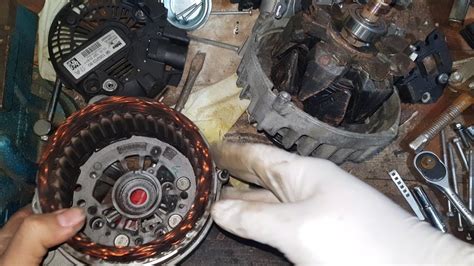Essential Guide to Alternator Bearings: Maintaining Optimal Charging Performance
Introduction
Alternators play a pivotal role in the electrical system of a vehicle, converting mechanical energy into electrical energy to power the battery and various electronic components. Nestled within the alternator assembly, bearings serve as critical components that support the smooth operation and longevity of the alternator. This comprehensive guide delves into the realm of alternator bearings, exploring their significance, types, failure modes, maintenance strategies, and potential benefits.
Significance of Alternator Bearings
Alternator bearings stand as the foundation of the alternator's rotating assembly. Their primary function is to minimize friction between moving parts, ensuring the smooth and efficient rotation of the rotor within the stator. By reducing friction, bearings extend the alternator's lifespan and enhance its charging capabilities. According to the National Automotive Parts Association (NAPA), alternator bearings account for up to 80% of alternator failures, highlighting their critical nature in maintaining optimal charging performance.
Types of Alternator Bearings
Alternator bearings come in various types, each designed to meet specific operating conditions and performance requirements. The two primary types of alternator bearings are:


-
Ball Bearings: Consist of a set of hardened steel balls that roll between an inner and outer race, providing low friction and high-speed operation.
-
Roller Bearings: Use cylindrical rollers instead of balls, offering higher load capacity and better durability in harsh environments.

Failure Modes of Alternator Bearings
Alternator bearings can fail due to various factors, including:
-
Lubrication Failure: Lack of proper lubrication can lead to increased friction, heat buildup, and premature bearing failure.
-
Overloading: Exceeding the bearing's load capacity can cause it to collapse or seize up.
-
Contamination: Ingress of dirt, water, or other contaminants can damage the bearing surfaces and lead to failure.
-
Fatigue: Repeated stress cycles over time can weaken the bearing material and result in fatigue failure.
Maintenance Strategies for Alternator Bearings
Regular maintenance is crucial for extending the life of alternator bearings. Effective strategies include:
-
Routine Inspection: Periodically inspect the bearings for any signs of damage, wear, or contamination.
-
Proper Lubrication: Ensure that the bearings are adequately lubricated according to the manufacturer's specifications.
-
Avoid Overloading: Avoid putting excessive loads on the alternator, which can strain the bearings.
-
Early Detection: Listen for any unusual noises, such as squealing or grinding, which may indicate bearing problems.

Benefits of Maintaining Alternator Bearings
Maintaining alternator bearings offers numerous benefits, including:
-
Extended Alternator Lifespan: Proper bearing maintenance extends the life of the alternator, reducing the need for costly replacements.
-
Optimal Charging Performance: Healthy bearings ensure efficient alternator operation, providing optimal charging voltage to the battery and electrical components.
-
Reduced Downtime: By preventing premature bearing failure, you minimize vehicle downtime and costly repairs.
-
Enhanced Fuel Efficiency: A well-maintained alternator optimizes charging efficiency, contributing to improved fuel economy.
-
Reduced Emissions: Improved alternator performance reduces emissions by ensuring proper charging of the battery, which supports the efficient operation of emission control systems.
Case Studies: Humorous Tales of Alternator Bearing Misadventures
Story 1:
The tale of the "Screeching Symphony" tells the story of a driver whose alternator bearings had reached the end of their life. As they drove down a busy highway, the bearings let out a piercing screech, attracting the attention of passersby and fellow drivers alike. The driver's embarrassment grew with each mile, but the laughter and amusement of others served as a reminder to get those bearings replaced!
Story 2:
Meet the "Flashing Lights of Doom." One unfortunate driver discovered that their alternator bearings had failed while driving at night. The sudden loss of charging power caused the battery to die, leaving the driver stranded in darkness. As they frantically tried to restart the car, the faint glow of the dashboard lights flickered erratically, creating an eerie and unforgettable experience.
Story 3:
The "Battery Blues" befell a driver who neglected to maintain their alternator bearings. As they drove, the bearings slowly deteriorated, reducing the alternator's ability to charge the battery. Over time, the battery lost its charge, leaving the driver with a dead vehicle and a valuable lesson in the importance of regular maintenance.
What we learn from these stories:
- Neglecting alternator bearings can lead to embarrassing and inconvenient situations.
- Regular maintenance and timely bearing replacements can prevent such misadventures.
- A well-maintained alternator ensures a smooth and reliable driving experience.
FAQs on Alternator Bearings
Q1: How often should alternator bearings be replaced?
A: The replacement interval varies depending on the vehicle, driving conditions, and alternator type. Consult your vehicle's maintenance schedule or a qualified mechanic for specific recommendations.
Q2: Can I replace alternator bearings myself?
A: Replacing alternator bearings requires specialized tools and knowledge. It is generally recommended to seek professional assistance from a qualified mechanic.
Q3: What are the signs of bad alternator bearings?
A: Unusual noises (squealing, grinding), flickering lights, battery discharge, and reduced charging voltage are common symptoms of worn or damaged alternator bearings.
Q4: How can I prevent alternator bearing failure?
A: Regular maintenance, proper lubrication, and avoiding overloading the alternator are effective strategies to prevent bearing failure.
Q5: Can I drive with bad alternator bearings?
A: It is not advisable to drive with bad alternator bearings. Doing so can worsen the damage, lead to more costly repairs, and potentially leave you stranded.
Q6: How much does it cost to replace alternator bearings?
A: The cost of alternator bearing replacement varies depending on the vehicle and the extent of the repair. Contact a qualified mechanic for an estimate.
Call to Action
Maintaining alternator bearings is essential for ensuring optimal charging performance and extending the life of your vehicle's electrical system. Implement the maintenance strategies discussed in this guide, and consult a qualified mechanic if you experience any signs of bearing problems. By taking proactive steps to care for your alternator bearings, you can avoid costly repairs and ensure a reliable driving experience for years to come.
